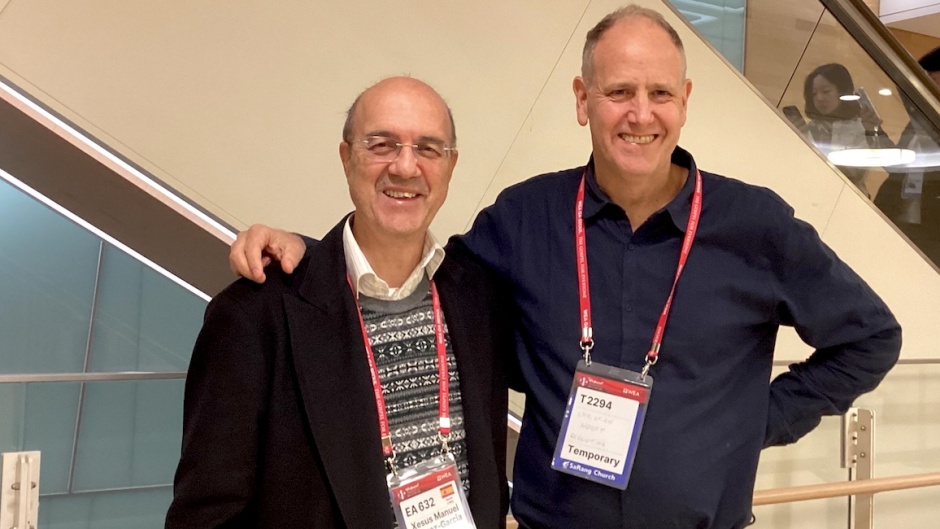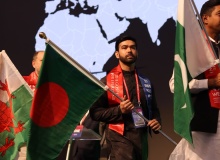The World Evangelical Alliance held its general assembly in Seoul. Xesús Manuel Suárez shares his experience at a gathering that marks a turning point for the global evangelical body.
 Xesús Manuel Suárez, general secretary of the Spanish Evangelical Alliance (left), with Christian Hoft, general secretary of the Argentinian Evangelical Alliance ACIERA, in Seoul, during the World Evangelical Alliance General Assembly.
Xesús Manuel Suárez, general secretary of the Spanish Evangelical Alliance (left), with Christian Hoft, general secretary of the Argentinian Evangelical Alliance ACIERA, in Seoul, during the World Evangelical Alliance General Assembly.
The World Evangelical Alliance (WEA) held its General Assembly last week in Seoul, South Korea, bringing together nearly a thousand delegates from more than 100 countries. The meeting was marked by reflection on the global role of the church, the growing relevance of the 'Global South', and the need to strengthen cooperation between national alliances.
Among the participants was Xesús Manuel Suárez, general secretary of the Spanish Evangelical Alliance (AEE), who was involved in one of the key decisions at the assembly: revising the statutes through a participatory process involving national and regional alliances.
In an interview with Spanish news website Protestante Digital, Suárez highlighted his personal experiences, his perception of the evangelical history in Korea and the parallels with Spain, and one of the objectives presented during the assembly, which is collaboration for the advancement of the gospel worldwide, with 2033 as the horizon.
Question. What was your experience of participating in the General Assembly of the World Evangelical Alliance in Korea?
Answer. It was a very beautiful and impactful experience. I had already been to the previous one in Indonesia, but this one touched me more. This time I was already familiar with many people and it was enriching to reconnect and grow together. Korea is an impressive country, with enormous economic development and, at the same time, remarkable growth in evangelical Christianity: today they represent about 25% of the population.
Its history reminded me a lot of Galicia. At the end of the 19th century, British and American missionaries arrived, mainly Presbyterians and Methodists, who came not to impose, but to serve: hospitals, education, defence of culture and language. That transformed the country and opened doors to the gospel. I was impressed to see that heritage in the Korean church today.
[destacate] “As a Spanish Evanglical Alliance, we are aware of our limitations and at the same time we are aware that the Lord can do great things with small things”[/destacate]Q. How has the interaction with other leaders and national alliances been?A. Very good. I already knew many general secretaries, especially from Europe and Latin America, and it was nice to strengthen those ties. There were also some curious anecdotes that help to strengthen brotherhood.
I spoke with leaders from Ecuador, Portugal, France, Bulgaria... And also with brothers from very difficult contexts, such as a Kurdish leader from Iraq who evangelises even radical Muslims. These encounters teach and encourage you. Seeing their fearlessness and dedication moves you to pray more and learn from them.
Q. The Assembly approved the reform of the statutes. The Spanish Evangelical Alliance has played an important role in that process. What does this mean?
A. It has been very significant for us. We are a small alliance, but we have been part of the World Alliance for almost 150 years. We felt that it was necessary to improve the relationship between the governing bodies and the national alliances, and we proposed a comprehensive reform process. We shared this with many leaders, seeking consensus, and received unanimous support. Everyone has seen that the Spanish Evangelical Alliance works wholeheartedly for the World Alliance and we have been a reference point. This gives us a deep sense of humility, because we are aware of our limitations and at the same time we are aware that the Lord can do great things with small things, and on this occasion he has certainly done so.
Q. There was also a space for the European Evangelical Alliance to meet.
A. Yes. It was a very good time to share projects, such as our School of Political Training. One of the most emotional encounters was with Vitali, secretary general of the Russian Alliance, who published a letter denouncing the invasion of Ukraine, and with Yuri, from the Ukrainian Alliance. Hearing Yuri say, ‘I never thought I would ask myself where my son is now,’ with his son on the front line, was very touching. These are examples, but in general, at the assembly we talk about profound things, about development, programmes, projects, and we do so from a relationship of mutual affection that unites us. This is something that does not happen in other organisations and is the result of our unity in the gospel.

[photo_footer] The global south is the emerging force in the evangelical sphere. / Photo: WEA [/photo_footer]
Q. How have you seen the growing prominence of the global south in the evangelical movement?
A. It's obvious. I shared a room with the general secretary of Gabon, a highly educated man with a living faith. We talked a lot and prayed together. I also had symbolic experiences, such as getting lost in Seoul and an African sister saying, ‘Let's wait for the reverend, he's Fulani, they never get lost.’ And so it was: he arrived and guided us. It seemed to me a prophetic image of where we are going: Europe learning from the leadership of the global south. We have to recognise that there are many people who think so much better than we do.
[destacate] “I had symbolic experiences, such as getting lost in Seoul and an African sister saying, ‘Let's wait for the reverend, he's Fulani, they never get lost'” [/destacate]Q. One of the topics mentioned was Vision 2033. What can you tell us about it?
A. It is a project that seeks to focus on the year 2033, the 2000th anniversary of the Lord's death and resurrection, and to promote that 50% of humanity hear the gospel. I met Olivier, one of the promoters, a well-prepared and very convinced man. He wants Spain to be involved and encouraged us to join.
Q. Personally, is there anything else you are taking away from this Assembly?
A. Two things. One, the lesson that small things also count. Presenting a proposal for statutory reform from Spain seemed utopian, and the Lord used it. That makes me feel smaller, not bigger. It is an invitation to consensus, to distinguish the fundamental from the incidental. I have always worked for consensus, but I have been fully reaffirmed by this experience that the Lord has given me.
And second, a powerful spiritual experience: on the last day, I went to see a mountain where ancient Korean kings are buried. All their human glory is there, reduced to bones. It reminded me of a small hill in Galicia where our brothers who gave their lives so that others might know Christ are buried. Those brothers who are buried in that little square on that hill at the end of Galicia today have the glory that the those ancient Korean kings will never have.
[analysis]
[title]Join us to make EF sustainable[/title]
[photo][/photo]
[text]At Evangelical Focus, we have a sustainability challenge ahead. We invite you to join those across Europe and beyond who are committed with our mission. Together, we will ensure the continuity of Evangelical Focus and our Spanish partner Protestante Digital in 2025.
Learn all about our #TogetherInThisMission initiative here (English).
[/text][/analysis]

Las opiniones vertidas por nuestros colaboradores se realizan a nivel personal, pudiendo coincidir o no con la postura de la dirección de Protestante Digital.
Si quieres comentar o